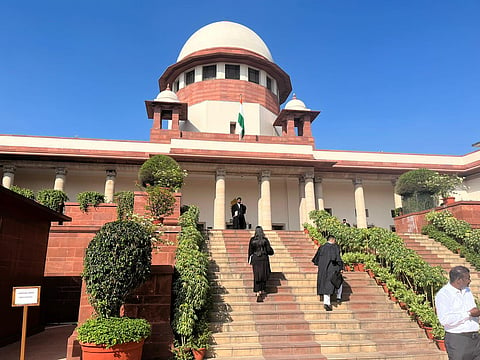

CUTTACK: The Supreme Court has set aside an Orissa High Court judgment which had held that a person employed in Central Council for Research in Ayurvedic Service under the Ministry of AYUSH was entitled to get the benefit of enhancement of retirement age from 60 to 65 years like AYUSH doctors.
The SC bench of Chief Justice of India (CJI) Dr DY Chandrachud and Justice JB Pardiwala observed, “We may only say that the entire approach of the high court towards the present litigation was incorrect. We are a bit disappointed to observe that the high court dealt with the present litigation in a very casual manner.”
The Orissa High Court division bench of Justice Sanju Panda (the then Judge) and Justice SK Panigrahi had quashed the Central Administrative Tribunal (CAT)’s order that had rejected Dr Bikartan Das’ plea seeking the extension of his superannuation age to 65 on December 17, 2020.
The CJI’s bench said, “The high court misdirected itself by saying the benefit of enhanced age of superannuation can also be granted if the duties performed are the same as AYUSH doctors. We fail to understand how can the court fix the age of superannuation of an employee saying he is very much devoted towards his job. The age of superannuation is always governed by statutory rules and other service conditions. In view of this, we have reached the conclusion that the impugned order passed by the high court is not sustainable in law and the same deserves to be set aside.
Dr Das, an AYUSH doctor, was initially appointed as a research assistant in Ayurvedic Service in 1985, was subsequently promoted to research officer and later promoted to the post of assistant director, Central Ayurvedic Research Institute for Hepatobiliary Disorders, Bhubaneswar.
The CJI’s bench further observed, “The high court went to the extent of granting interim relief extending the period of service beyond 60 years till the disposal of the original petition by the CAT. By virtue of such an interim order which the high court ordinarily should not grant, Dr Das although was to retire in 2018 yet continued in service till 2021. It is only when this court stayed the operation of the impugned order passed by the high court while issuing notice that the service of Dr Das came to an end”.
The CJI’s bench further cautioned stating, “The court or the tribunal should, therefore, be slow and circumspect in granting interim relief for continuation in service, unless prima facie evidence of unimpeachable character is produced because if the public servant succeeds, he can always be compensated. But if he fails, he would have enjoyed the undeserved benefit of extended service and merely caused injustice to his immediate junior.